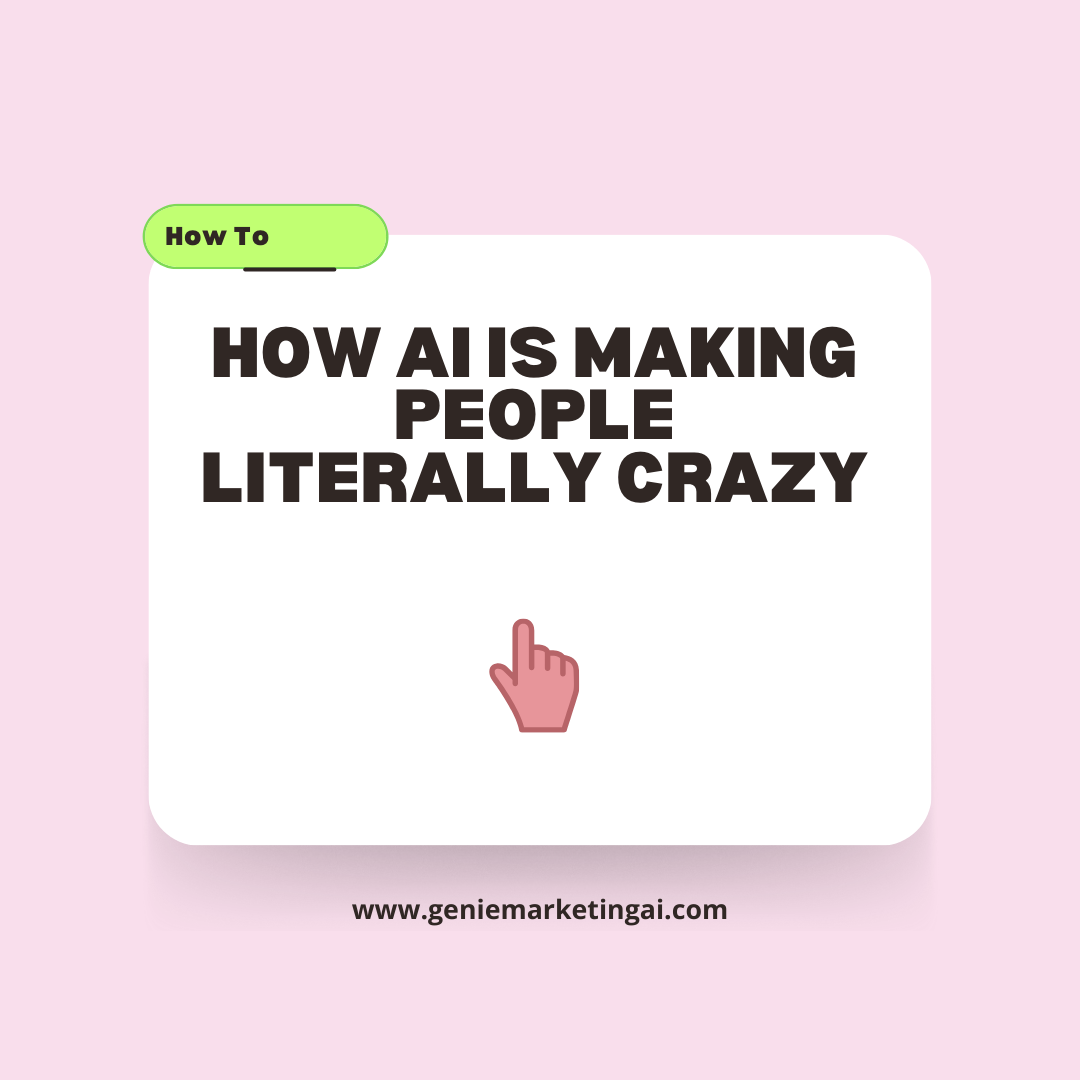Imagine this: anxiety rates among teens and adults have skyrocketed in the past decade. Depression, stress, and burnout are more common than ever. At the same time, artificial intelligence (AI) has quietly taken over how we search, shop, watch, talk, and even think. Coincidence? Probably not.
This isn’t an anti-AI rant. AI is powerful, exciting, and useful. But it also has psychological side effects that we’re only beginning to understand. From hijacking our attention to creating identity crises, AI is changing not only the world around us—but the world inside our heads.
This blog explores how AI is affecting mental health and human behavior in real ways. We’ll look at the science behind it, share relatable examples, and—most importantly—offer solutions so we can use AI without losing ourselves.
The Dopamine Hijacking Effect
Algorithm-Driven Addiction Cycles
AI runs most social media apps. Its main job? Keep you scrolling. Platforms like TikTok, Instagram, and YouTube don’t care about your well-being—they care about your engagement.
AI learns what you watch, like, or linger on, then feeds you more of it. It uses something psychologists call “variable reward schedules”—the same trick slot machines use. Sometimes you see something boring. Sometimes you see something exciting. That unpredictability keeps you hooked.
Every “like” you get releases a hit of dopamine, the brain’s feel-good chemical. Over time, your brain starts craving it like candy. This is why people compulsively check notifications even when they don’t want to.
Decision Paralysis from Infinite Options
Another side effect? Too many choices.
AI recommendation engines flood us with endless movies to stream, products to buy, and accounts to follow. Instead of helping, this can backfire. Psychologists call it “analysis paralysis.”
Think about Netflix. How often have you spent 30 minutes scrolling, only to give up watching anything? That frustration is real mental fatigue. Every choice—even small ones—costs brain energy. AI multiplies those choices, overwhelming our decision-making system.
Identity Crisis in the Age of Personalization
The Filtered Bubble Phenomenon
AI doesn’t just show us content—it shapes our worldview. Recommendation systems create echo chambers where we only see opinions we already agree with. This reinforces biases and makes it harder to understand others.
Over time, people lose common cultural ground. Instead of sharing reality, we each live in personalized bubbles of “truth.”
Authentic Self vs. Algorithmic Self
On top of that, many people shape their online identities based on what algorithms reward. Want more likes? Post a filtered selfie. Want more reach? Say something outrageous.
This creates a split between the authentic self (who you really are) and the algorithmic self (who you present online). Living in this gap can cause stress, confusion, and even identity crises—especially for teens still figuring out who they are.
The Comparison Trap: AI-Curated Perfection
Unrealistic Standards Through AI Enhancement
AI image filters and editing tools can make anyone look flawless. But when perfection becomes the norm, it warps our sense of reality.
Scrolling Instagram, you might think everyone is fit, rich, and glowing. In reality, it’s AI-enhanced smoke and mirrors. This leads to body dysmorphia, low self-esteem, and feelings of inadequacy.
FOMO and Social Anxiety Amplification
AI doesn’t just show polished photos—it shows you what you’re missing out on. Your feed highlights vacations, parties, promotions, and new relationships. Psychologists call this FOMO (fear of missing out), and it’s strongly linked to anxiety and depression.
Instead of feeling happy for others, people feel left behind. The constant comparison becomes a mental health drain.
Cognitive Overload and Attention Fragmentation
Information Overwhelm
AI-generated content is everywhere—blogs, videos, memes, even fake news. It floods our feeds 24/7. No human can possibly keep up.
But AI convinces us we should keep up. That creates information overload—a state where your brain is bombarded with so much input it can’t process clearly. The result? Stress, fatigue, and poor decision-making.
Shortened Attention Spans
Short-form content like TikTok has rewired how our brains focus. Instead of watching a 20-minute video, we crave a 20-second dopamine burst.
Over time, this trains us to prefer shallow, fast content over deep focus. Reading books, studying, or doing creative work becomes harder. Psychologists warn this shift may affect not only attention spans but also memory, comprehension, and problem-solving.
The Uncanny Valley of AI Relationships
Parasocial Relationships with AI
AI isn’t just entertaining us—it’s talking to us. Chatbots, voice assistants, and virtual friends are growing more human-like every day.
Some people form parasocial relationships (one-sided emotional bonds) with AI companions. While this can ease loneliness, it may also deepen isolation by replacing real human connections.
Trust and Authenticity Issues
At the same time, deepfakes and AI-generated media blur the line between real and fake. Who can you trust when even videos can be fabricated?
Constant skepticism creates psychological strain. Humans rely on trust for mental stability. If reality itself feels unreliable, anxiety and paranoia naturally rise.
Economic Anxiety and Job Displacement Fears
The Automation Anxiety Epidemic
AI is changing jobs everywhere. From self-checkout kiosks to automated copywriters, entire industries are being reshaped. Workers worry: Will I be replaced next?
This fear of job loss—called automation anxiety—fuels stress, insomnia, and depression. Even if you keep your job, the pressure to constantly reskill can feel overwhelming.
Economic Identity Crisis
For generations, careers defined identity. “I’m a teacher.” “I’m a mechanic.” But as AI changes or replaces these roles, many feel lost.
The gig economy, powered by AI platforms, makes work less stable and more transactional. Without clear career paths, people struggle with professional identity crises and a loss of long-term purpose.
The Surveillance State of Mind
Privacy Paranoia and Digital Anxiety
AI tracks what you watch, buy, and even say. Every ad you see is carefully targeted. While convenient, this constant monitoring creates digital anxiety.
Many people feel watched, manipulated, or even violated. Knowing that every click feeds an algorithm can make the internet feel less like freedom and more like surveillance.
The Panopticon Effect
This awareness leads to self-censorship. People modify behavior—what they post, how they speak—because they assume AI is always monitoring.
This “panopticon effect” (named after a prison design where inmates never know if they’re being watched) creates mental strain. Living under constant performance pressure is exhausting.
Solutions and Coping Strategies
The good news: we’re not helpless.
Individual-Level Interventions
-
Digital Detox: Take breaks from screens. Even one day a week helps reset your brain.
-
Mindful Tech Use: Ask yourself: “Am I choosing this, or is the algorithm choosing for me?”
-
Boundaries: Set app limits, turn off notifications, or use apps that track your screen time.
-
Critical Media Literacy: Learn to question what you see online. Not every “fact,” photo, or video is real.
Systemic Changes Needed
While personal choices help, big problems need big solutions:
-
Regulation of attention-capture technologies so platforms can’t exploit addiction science unchecked.
-
Algorithmic transparency to reveal how recommendations are made.
-
Mental health considerations in AI design so well-being becomes a feature, not an afterthought.
Reclaiming Human Agency
AI is here to stay. It’s not evil, but it is powerful—and power always has side effects.
We’ve seen how algorithms can hijack dopamine, create identity crises, amplify comparison, shorten attention spans, increase economic anxiety, and foster surveillance stress. But we’ve also seen that awareness is the first step toward balance.
The challenge of our time is to use AI without letting it use us. That means conscious engagement, systemic safeguards, and a focus on mental health.
AI can shape our future—but it doesn’t have to shape our sanity. The key is remembering one thing: we are human first, digital second.



Should you be exploring your style through seasonal color analysis, tools like Color Analysis Pro or several free online quizzes can be a wonderful start to understanding your special palette. For example, if you’re curious whether you belong to the deep summer color season, learning about the deep summer palette—known for its cold, muted, and soft hues—can actually help in choosing clothing and makeup that complement your natural features.
If you want a more exact assessment, AI color analysis apps provide personalized insights by scanning your skin tone, including trending options for yellow skin tone colors to wear or even certain palettes like soft autumn and light summer. For those curious how to cancel Color Analysis Pro or navigate its features, instructions and community tips are commonly shared on forums and legitimate sites [url=https://color-analysis-quiz.org]how to determine what season you are[/url] . This way, you can examine seasonal colors, hair color trends for 2026, and even virtual hair color try-ons without complications.
Gigabet login? Smooth as butter, and that’s coming from someone who usually struggles with logins. The interface is clean and the loading times are quick, no laggy stuff I hate that. Check this out to get started: gigabetlogin